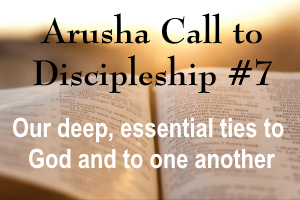The World Council of Churches’ Conference on World Mission and Evangelism met in Arusha, Tanzania, in March 2018. From this meeting, the more than 1,000 participants, who were all regularly engaged in mission and evangelism, issued the Arusha Call to Discipleship. At our own national church General Synod in 2019, resolution A-129 was passed that we affirm the Arusha Call; encourage bodies within the General Synod to integrate this call into the guiding principles of baptismal living for the shaping of national ministries; and commend the Arusha Call to dioceses for study and inclusion in their considerations of evangelism, witness and discipleship.
Spiritual Development Team members and others are offering reflections in the New Brunswick Anglican on the 12 points within this call. This is Call # 7, written by Kurt Schmidt, Director of Christian Formation at Christ Church Cathedral, and a member of L’Arche Fredericton. Cathedral Dean Geoffrey Hall previously wrote a reflection on Call #5.
We are called as disciples to belong together in just and inclusive communities, in our quest for unity and on our ecumenical journey, in a world that is based upon marginalization and exclusion.
Let’s take this seventh call and consider three special emphases in it, in the reverse order of their appearance:
1. We are called as disciples to belong together in just and inclusive communities. Happily for us, our vocation as disciples requires that we work with and alongside others.

Here we might also call to mind the ubuntu theology promoted by Desmond Tutu — the recognition that our humanity is fully and properly understood only in the context of our relationships with others.
Or, as Shawn Branch pointed out in a previous article in this series: “We do this, together, because we were designed for community and connectivity.”
2. We are called as disciples to belong together in just and inclusive communities. Here is where some hard work may be required.
These others will inevitably include people from the margins of society, people who may be very different from us in temperament, thinking, outlook or ability, and/or people who may just rub us the wrong way.
But it is not enough simply to gather ourselves into diverse groups of tolerant acceptance. Our effort(s) to live justly and inclusively — that is, rightly — must flow from a life of deep prayer.
Or, as Jasmine Chandra reminded us in another previous article in this series: “It requires engagement with the Holy Spirit.”
This spiritual engagement will then show forth in mutually transforming and transformative relationships. It will manifest as mercy, forgiveness, and even the exuberant, delighted celebration of the diversity of beauty in God’s creatures.
In other words, it will mean that we recognize, realize, and actually live out what Gregory Boyle calls our “radical kinship”— our deep, essential ties to God and to one another. And this brings us to the third and final consideration:
3. We are called as disciples to belong together in just and inclusive communities. This emphasis on belonging is perhaps the most important aspect of the seventh Arusha call.
Moreover, as Billy Swan tells us: “To be human is to belong, for it ties together both our existence (to be) and our longing (to long for God, to long for home). This is why the ‘be-long’ is so important.”
And what is the source of this belonging? The astonishing, mysterious gift of grace that is somehow ours through baptism — our reception into the household of God in the name of the Trinity, that primordial, dynamic, model community of Love.
It is the act and fact of our being marked “as Christ’s own forever” that means we belong.
And as we all know, membership has its privileges — as well as its responsibilities. Living out our belonging — with-in and among inclusive, just communities — comprises the lifelong work of our disciple-ship, as described so insight-fully and comprehensively in The Arusha Call.
So let us proceed — let us undertake our vocation(s) as disciples — wholeheartedly, together, in safety, freedom, and joy!
by Kurt Schmidt
